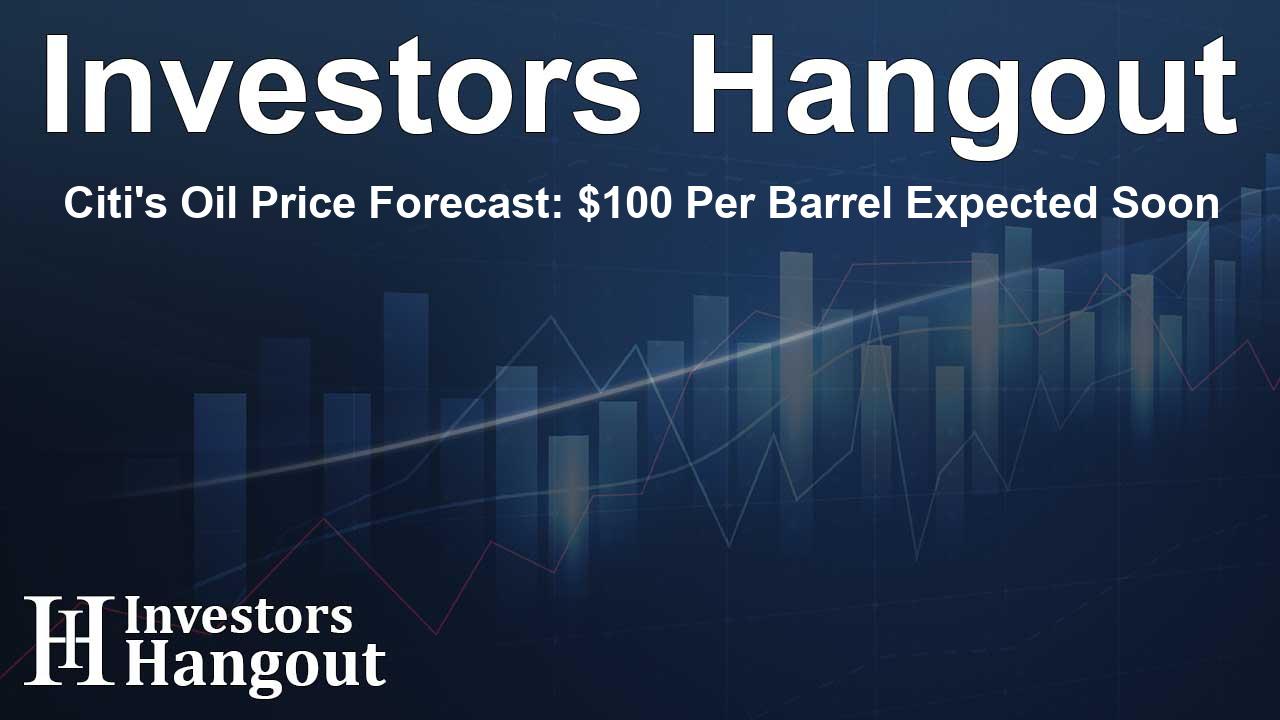Citi's Oil Price Forecast: $100 Per Barrel Expected Soon

Potential Surge in Oil Prices Due to Geopolitical Tensions
Citi Research recently updated its projections for oil prices, highlighting a significant possibility that prices could escalate above $100 per barrel. The reason for this prediction stems from increasing tensions in the Middle East, which could lead to either anticipated or actual losses in oil supply. This situation has fueled market fears and could drive prices higher in the immediate future.
Revised Oil Price Outlook
Citi has notably revised its bullish outlook for the fourth quarter of 2024 and the first quarter of 2025, adjusting the forecast from $80 to a surprising $120 per barrel. This adjustment reflects the bank's concerns about the volatility in the oil market, considering the geopolitical issues influencing supply.
Baseline and Bear Scenarios
Despite the bullish outlook, Citi maintains a cautious baseline forecast, expecting Brent crude prices to stabilize around $74 per barrel in Q4 2024, followed by a dip to $65 in Q1 2025. The firm also reiterated its bear case scenario where OPEC+ might increase production in December, predicting a price level of $60 per barrel by the end of 2024 and $55 by early 2025.
Current Market Conditions
Brent crude futures are currently trading near $77 per barrel, while U.S. West Texas Intermediate (WTI) crude futures sit at approximately $74 per barrel. These figures exhibit the ongoing fluctuations in the market, influenced by various geopolitical factors.
Historical Context of Oil Supply Disruptions
Looking back through history, Citi analyzed major geopolitical events impacting oil supply. The findings suggest that significant disruptions related to geopolitical risks typically do not last over a few quarters, which might provide a sense of reassurance regarding price stability in the long run.
Conclusion: What Lies Ahead for Oil Pricing?
As we move forward, the oil market faces uncertainty primarily driven by Middle East tensions. Investors and analysts alike will be closely monitoring developments as these could dictate the next shifts in oil pricing. Given the current assessments from Citi, price movements should remain dynamic, and understanding potential outcomes will be crucial for stakeholders within the oil sector.
Frequently Asked Questions
What is Citi's revised bullish case for oil prices?
Citi has revised its bullish case for oil prices to $120 per barrel for Q4 2024 and Q1 2025, up from $80.
What is the baseline forecast for Brent crude?
The baseline forecast for Brent crude is $74 per barrel in Q4 2024 and $65 per barrel in Q1 2025.
What are the current prices for Brent and WTI crude?
Brent crude is approximately trading at $77 per barrel, while WTI crude sits at around $74 per barrel.
What does Citi suggest about the longevity of geopolitical risks?
Citi indicates that historical geopolitical events affecting oil supply usually do not persist longer than a few quarters.
What factors could influence future oil price movements?
Future oil prices could be influenced by ongoing geopolitical tensions, OPEC+ production decisions, and broader market fundamentals.
About The Author
Contact Owen Jenkins privately here. Or send an email with ATTN: Owen Jenkins as the subject to contact@investorshangout.com.
About Investors Hangout
Investors Hangout is a leading online stock forum for financial discussion and learning, offering a wide range of free tools and resources. It draws in traders of all levels, who exchange market knowledge, investigate trading tactics, and keep an eye on industry developments in real time. Featuring financial articles, stock message boards, quotes, charts, company profiles, and live news updates. Through cooperative learning and a wealth of informational resources, it helps users from novices creating their first portfolios to experts honing their techniques. Join Investors Hangout today: https://investorshangout.com/
The content of this article is based on factual, publicly available information and does not represent legal, financial, or investment advice. Investors Hangout does not offer financial advice, and the author is not a licensed financial advisor. Consult a qualified advisor before making any financial or investment decisions based on this article. This article should not be considered advice to purchase, sell, or hold any securities or other investments. If any of the material provided here is inaccurate, please contact us for corrections.
